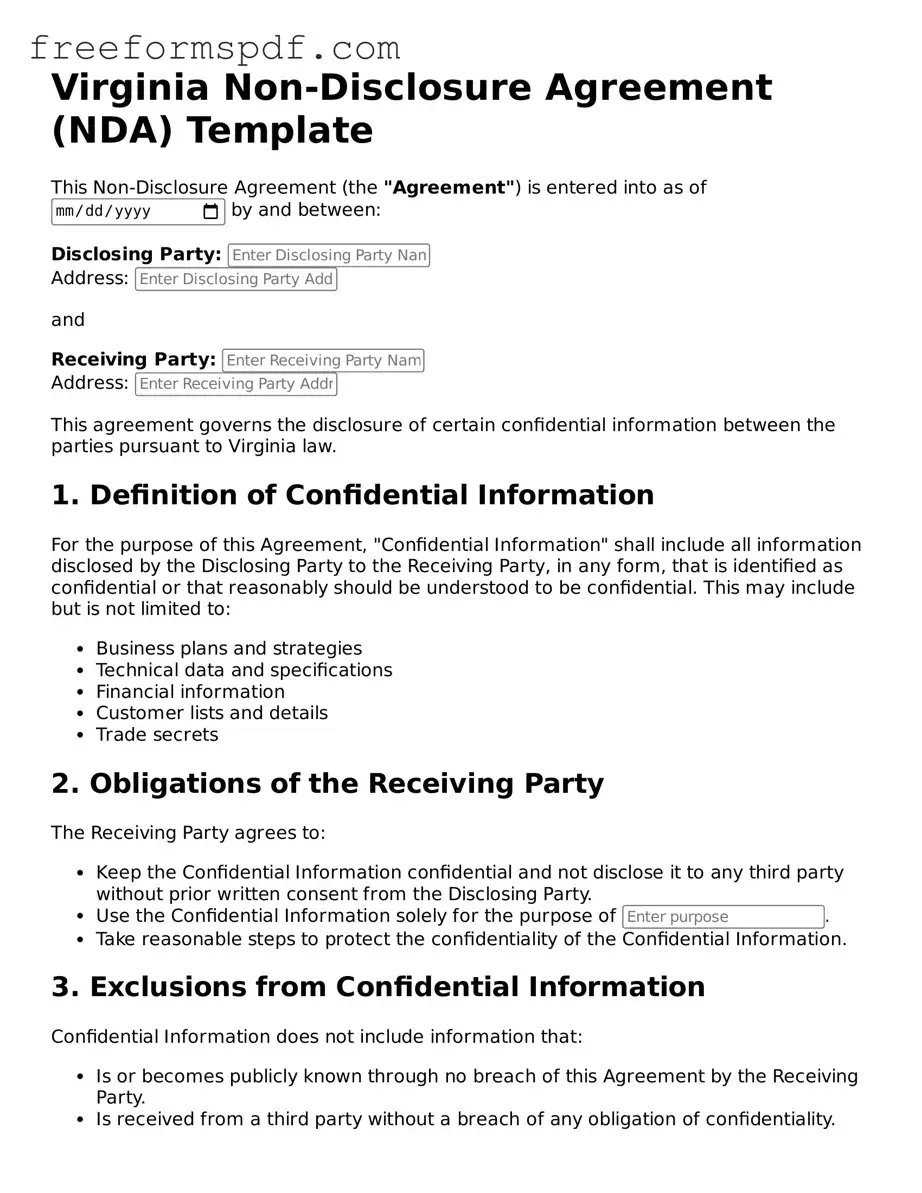Attorney-Verified Non-disclosure Agreement Document for Virginia State
Common mistakes
-
Not Clearly Identifying Parties: One common mistake is failing to accurately identify all parties involved. Ensure that the names of individuals or entities are complete and correct. This clarity prevents confusion later on.
-
Vague Definitions of Confidential Information: People often use broad or unclear terms to describe what information is considered confidential. Be specific. Clearly outline what constitutes confidential information to avoid misunderstandings.
-
Omitting Timeframes: Some individuals forget to include the duration of the confidentiality obligation. Specify how long the information must remain confidential. This timeframe is crucial for both parties to understand their responsibilities.
-
Ignoring Jurisdiction and Governing Law: Failing to state which state’s laws will govern the agreement can lead to complications. Clearly indicate the jurisdiction to avoid legal disputes over enforceability.
Learn More on This Form
-
What is a Virginia Non-disclosure Agreement (NDA)?
A Virginia Non-disclosure Agreement is a legal contract designed to protect confidential information shared between parties. This agreement ensures that sensitive information, such as trade secrets, business plans, or proprietary data, remains confidential and is not disclosed to unauthorized individuals or entities. It is often used in business relationships, employment situations, or during negotiations to safeguard intellectual property and other critical information.
-
Who should use a Non-disclosure Agreement in Virginia?
Any individual or business that plans to share sensitive information should consider using a Non-disclosure Agreement. This includes entrepreneurs discussing their ideas with potential investors, companies sharing proprietary technology with partners, or employers revealing internal processes to employees. Essentially, if you have valuable information that you want to keep private, an NDA can provide legal protection.
-
What are the key components of a Virginia NDA?
A typical Virginia Non-disclosure Agreement includes several important elements:
- Definition of Confidential Information: Clearly outlines what constitutes confidential information.
- Obligations of the Receiving Party: Specifies what the receiving party can and cannot do with the confidential information.
- Duration of the Agreement: States how long the confidentiality obligations will last.
- Exclusions: Identifies information that is not considered confidential, such as information already in the public domain.
- Consequences of Breach: Details the potential repercussions if the agreement is violated.
-
How do I enforce a Non-disclosure Agreement in Virginia?
If you believe that a party has violated the terms of your NDA, you can take several steps to enforce it. First, gather evidence of the breach. This may include emails, documents, or witness statements. Next, consider reaching out to the offending party to resolve the issue amicably. If that doesn’t work, you may need to seek legal advice and potentially file a lawsuit. Courts in Virginia generally uphold NDAs, provided they are reasonable and clearly defined.
Misconceptions
Non-disclosure agreements (NDAs) are often misunderstood, leading to confusion about their purpose and application. Here are six common misconceptions regarding the Virginia Non-disclosure Agreement form:
-
All NDAs are the same.
Many people believe that all NDAs have identical terms and conditions. In reality, NDAs can vary significantly based on the specific needs of the parties involved. Each agreement should be tailored to address the unique circumstances of the situation.
-
NDAs are only for businesses.
While businesses frequently use NDAs to protect sensitive information, individuals can also utilize them. For example, freelancers or consultants may require an NDA to safeguard their proprietary ideas or client information.
-
Signing an NDA means you can never share information.
This misconception suggests that signing an NDA permanently restricts all communication. In fact, NDAs typically outline specific conditions under which information can be shared, such as with authorized personnel or if required by law.
-
NDAs are enforceable in all situations.
Some individuals think that NDAs are always legally binding. However, an NDA may not be enforceable if it is deemed overly broad, vague, or if it contradicts public policy. Courts evaluate the reasonableness of the terms.
-
Only confidential information is protected.
It is a common belief that NDAs only protect information labeled as confidential. However, NDAs can also cover trade secrets and proprietary information, even if they are not explicitly marked as such.
-
Once signed, an NDA cannot be modified.
Some people assume that NDAs are set in stone after signing. In reality, parties can negotiate changes to the agreement at any time, as long as both parties consent to the modifications.
Understanding these misconceptions can help individuals and businesses navigate the complexities of NDAs more effectively.
Some Other Non-disclosure Agreement State Templates
Whats an Nda - Confidential information covered by the NDA may include financial data, customer lists, and strategies.
When considering crucial business agreements, understanding the nuances of a well-structured Non-disclosure Agreement form is vital for ensuring the confidentiality of sensitive information. This document not only defines the obligations of the parties involved but also establishes a framework for protecting proprietary data. For more insights, visit this guide on the importance of the Non-disclosure Agreement.
Non Disclosure Agreement - Parties sign this agreement to prevent the unauthorized spread of sensitive information.
What Is an Nda - Prevents the unauthorized use of proprietary information.
Texas Non Disclosure - Defines the scope of confidentiality between involved parties.
